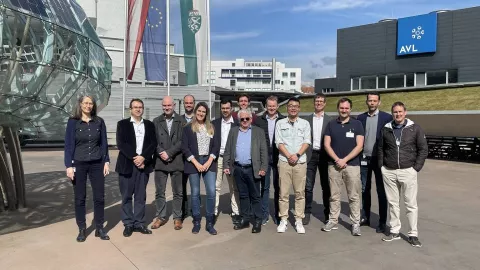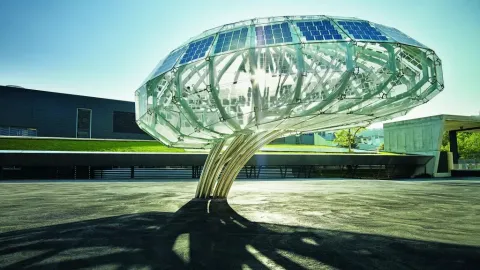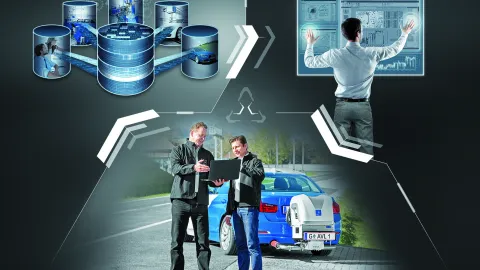AVL to Participate in Development of Advanced Integrated Multi-Fuel Powered H2-Propulsion System
- EN,
Horizon Europe Funded: Pioneering Multi-Fuel Powered H2-Propulsion
System Supports Decarbonization of Heavy Traffic

Together with the Research Center Jülich, the Institute CMT from Universitat Politècnica de València and the Institute of Chemical Technology (ITQ, UPV-CSIC), AVL is currently engaged in the development of a highly efficient integrated multi-fuel powered H2-propulsion system for heavy-duty transport applications. The system will make clean-fuel technologies more accessible to consumers by facilitating the storage and transportation of the energy carrier.
Valencia, Spain, May, 2023: In order to achieve the goal of climate neutrality, the EU Commission, among other things, intends to sharply reduce CO2 emissions from heavy commercial vehicles. By 2040, new trucks and buses are to emit 90% less CO2 compared to 2019, as the authority proposed. As an interim target, they should already emit 45% less CO2 by 2030. Hydrogen and fuel fell propulsion systems have emerged as feasible solutions on the way to net-zero mobility. The Horizon Europe founded ALL-IN Zero project is supporting this goal. Within its framework, the Research Center Jülich, the Institute CMT, the Institute of Chemical Technology and AVL are currently developing a pioneering H2-propulsion system that supports the decarbonization of the heavy-duty transport sector.
The overall system consists of a Compact Membrane Reactor (CMR) that can be fed with any type of fuel, for example, ammonia, natural gas, biogas or alcohols and convert them temporarily into high purity pressurized H2 to be used in either a fuel cell system or an internal combustion engine. Therefore, the resulting system will produce either low, zero, or even negative CO2 emissions when in-situ coupled with carbon capture and storage technology. It removes the requirement for expensive high-pressure H2 tanks, refueling and storage infrastructure. Moreover, it will provide an integrated clean propulsion system that will enable a significant increase in the range of hydrogen-fueled heavy-duty vehicles.
To evaluate the feasibility and potential of this concept, digital twins of the CMR, internal combustion engine (ICE), and fuel cell (FC) are being developed based on data from tests conducted in the project's second year. These digital twins will aid in identifying the optimal powertrain configuration, which will be further refined for emissions performance. Finally, the optimized powertrain concept will be compared to the current powertrain used in similar applications to evaluate its advantages and disadvantages.
Alberto Zumeta, Managing Director AVL Iberica SA, says: “The current global environmental roadmap has emphasized the need for alternative energies that can be generated and distributed locally more efficiently. Spain is leading the way in producing H₂ out of renewable energies such as solar or wind. AVL’s contribution to ALL-IN Zero project will support accelerating the road towards the Hydrogen Economy. We are proud to support local companies technically in H2 generation, FC development, and testing to realize a net zero future for all.”
Professor Ricardo Novella, researcher at institute CMT and Project Coordinator, remarks: “It is evident how the environmental concern is encouraging the scientific and industrial communities to cooperate in the design and implementation of new power generation solutions. In this context, the EU-funded project ALL-IN Zero will significantly contribute to this target by investigating an advanced, beyond the state of the art, and fuel-flexible power generation concept based on using hydrogen as an in-situ energy vector for decarbonization of transportation easily transferable to other key economic sectors. Despite the evident scientific and technological challenges, the top-level research institutions and industrial partners integrated in the consortium make me very confident and enthusiastic about the future development of this concept.”
AVL is a world-leading technology company specialising in development, simulation and testing in the automotive industry and other sectors such as rail, marine and energy. Through extensive research, AVL delivers concepts, technology solutions, methodologies and development tools for sustainable, safe and advanced mobility and beyond.
AVL supports international partners and customers in sustainable and digital transformation, with a focus on electrification, software, AI and automation. AVL also supports companies in energy-intensive sectors on their way to green and efficient energy generation and supply.
For more information: www.avl.com
Forschungszentrum Jülich GmbH (FZJ) is one of the 18 Helmholtz Association (HGF) research centers in Germany, devoted to investigating current issues in the areas of energy, environment, life, information, and matter contributing to basic research and long-term programs, applied research and key technologies. FZJ started in 2004 an interdisciplinary approach on membrane development for CO2 capture and utilization and membrane reactors. The Institute of Energy and Climate Research IEK-1 Materials Synthesis and Processing has the mission to develop materials and components for highly efficient future energy conversion and storage systems including ceramic membranes for efficient gas separation or for membrane reactors for the production of energy carriers.
Institute CMT is a research institute integrated into Universitat Politècnica de València (UPV) focused on thermofluid-dynamic processes with more than 100 personnel staff. For more than 40 years, CMT has been conducting applied studies to optimize the performance of industrial systems and assist in their development, as well as basic research to better understand the relevant physical processes involved. From deep scientific knowledge to applied problems in the automotive, aerospace, railway and marine industries, CMT combines experimental tests performed in state-of-the-art facilities and theoretical studies assisted by high-performance computational tools, providing relevant results from a technical and scientific point of view.
Instituto de Tecnología Química (ITQ) is a joint research center founded in 1990 by Consejo Superior de Investigaciones Científicas (CSIC) and Universitat Politècnica de València (UPV). ITQ is a worldwide recognized institute that integrates catalysis and materials science through a multidisciplinary approach. ITQ has a multidisciplinary research group with large experience in development and characterization of electro-catalytic materials and ionic membranes, as well as in the design, optimization and own fabrication of fully automated laboratory reactor prototypes, proved by the number of published publications, patents and the ongoing projects.

- EN,

- EN,

- EN,

- EN,
Stay up-to-date as a journalist with our latest press releases concerning company updates, research projects, our latest developments, and more.
Download our fact sheet to get a comprehensive overview about what we do as well as our latest company figures.

